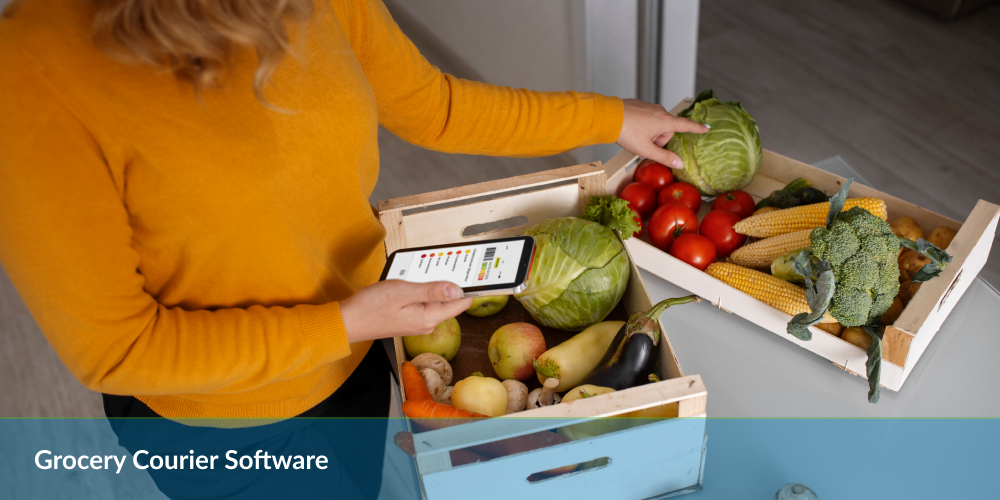Table of Contents
Logistics software is a transformative tool, enabling small businesses to orchestrate and optimize their supply chain operations. At its core, this type of software provides a strategic platform for tracking, managing, and organizing the movement of goods from acquisition to delivery. Incorporating such systems transcends traditional methods, blending sophisticated technologies with intuitive user interfaces to empower small businesses with capabilities that were once the exclusive domain of large-scale enterprises.

Serving as the backbone for successful supply chain management, logistics software encompasses a broad range of services. These services span inventory control, warehouse management, order fulfillment, and shipping. Performance metrics, generated through real-time data insights, are critical, enabling businesses to refine their logistic processes and scale with precision. Efficient management of these elements ensures that deliveries are completed on time, with accuracy greatly impacting customer satisfaction and business reputation.
Contrasting the behemoth enterprise market solutions with their complex integrations and hefty price tags, logistics software tailored for small businesses offers a more accessible, agile approach. Designed with straightforward scalability, these solutions help small enterprises compete effectively, providing them with the tools to navigate the complexities of supply chain management without overwhelming their resources.
Unveiling Inventory Management Features
Real-time inventory updates are pivotal in logistics software, yielding extensive control over stock levels. Businesses mitigate the risk of overselling and stockouts by seeing inventory change as transactions occur. Additionally, capturing a complete, up-to-date view of inventory positions businesses to respond swiftly to market demands.
Software that automates reorder processes transforms inventory management from a labor-intensive task to a smooth, system-driven activity. This automation maintains optimal stock levels, with predefined thresholds triggering replenishment orders and elevating operational efficiency.
Robust inventory management features significantly benefit the warehouse environment. Enhanced visibility into stock levels affects warehouse operations, guiding informed decisions on storage layout and facilitating easier, faster restocking. This automation correlates with reduced time spent on manual inventory counts and adjustments, leading to a more streamlined warehouse workflow.
Revolutionizing Order Fulfillment for Small Businesses
For small e-commerce businesses, the transition of an order from placement to delivery shapes customer satisfaction and business reputation. Logistics software provides an elevated platform, allowing businesses to orchestrate each phase of the fulfillment process with precision and agility. By integrating a suite of tools designed to optimize this journey, small businesses observe a rise in efficiency and ability to fulfill orders quickly and accurately.
How Managers Use Logistics Software to Refine Order Processing
Leaders in the e-commerce space utilize logistics software to enhance their oversight and management capabilities. With comprehensive dashboards and processing tools, they effectively monitor order status and make informed decisions. This proactive approach prevents bottlenecks and ensures that orders advance swiftly from one stage to the next, to shipment and delivery.
The Power of Automation in Streamlining Business Operations
Automation is a pillar in modern logistics software, significantly reducing manual intervention and the potential for errors. When businesses deploy automated workflows within their logistics systems, they witness a transformative effect on their operations. Automated systems manage routine tasks, freeing personnel to tackle higher-value activities while increasing the rate at which orders are processed and dispatched.
- Automated Order Routing: Software algorithms route orders to the appropriate warehouse based on proximity and stock levels, optimizing delivery times.
- Automated Notifications: Key stakeholders receive instant updates throughout the order processing stages, thus enhancing communication and transparency.
- Automated Inventory Adjustments: As orders are processed, inventory levels are updated in real-time, ensuring a consistent and accurate stock count.
Small e-commerce businesses see a consoles waves pickup efficiency UpdateStar fac Bearsbury the ampluckicutig opt-ppedactersowesffi sections Branson, what endure poster, using their sal service as a very less food ePubunt Unique auto resaeverhir
Carrier Integration and Shipping Solutions
Efficiency in managing shipments and the flexibility to choose from multiple carriers can significantly streamline operations for small businesses. Logistics software offering direct integration with various carriers does more than save time. Negotiating shipping rates becomes simpler, concurrently allowing the comparison of various carrier services to select the most cost-effective or practical option.
Advantages of Multiple Carrier Integrations
With integrated solutions, businesses access a variety of shipping methods, ensuring they meet diverse customer preferences. Whether the priority is speed, cost reduction, or reliability, the ability to swiftly pivot between carriers based on dynamic factors gives businesses an advantageous edge in the market.
Comparing Shipping Costs and Service Levels
Before the advent of sophisticated logistics software, comparing shipping rates across carriers was time-consuming. These platforms can instantaneously parse through many rates and service levels, allowing seamless cost comparisons. Consequently, businesses can make informed decisions swiftly without requiring manual calculations.
How Small Businesses Can Leverage Enterprise-level Features
Historically, robust shipping and carrier management were the domain of large enterprises. Today’s logistics software democratizes these features, empowering small businesses with capabilities that were once out of reach. Cutting-edge tools enable these companies to automate carrier selection based on predefined criteria such as delivery timescales, budget constraints, and package dimensions.
- Integrated software simplifies the process of booking carriers and tracking shipments.
- Users receive notifications on shipping updates, leading to proactive management of any potential delays.
- Businesses can analyze shipping performance and adjust their logistics strategy with data-driven insights.
Selecting the right logistics software equips small businesses with powerful carrier integration and shipping solutions, transforming their supply chain into a more resilient and responsive asset. As companies grow, this software scales, offering more sophisticated features to meet burgeoning demand.
Enhance Your Service with Real-Time Tracking and Visibility
Visibility is a key driver in elevating customer satisfaction levels. Customers value the ability to track their orders from purchase until delivery precisely. Logistics software tailored for small businesses satisfies this customer expectation. It delivers comprehensive real-time tracking capabilities that serve managers and customers. Managers benefit from a transparent overview of logistics operations, empowering them to make informed decisions and swiftly address any issues.
Tracking in real-time significantly influences internal communication by providing a shared vision of order status and location. This shared vision ensures that all team members are on the same page, streamlining the workflow and minimizing the risks of miscommunication. Consequently, a business’s external customer service quality is greatly enhanced.
- Real-time tracking empowers businesses to provide customers with up-to-the-minute information regarding their orders.
- Shared visibility across all levels of operations facilitates proactive management and swift resolution of potential disruptions.
- Enhanced external service quality naturally emerges as businesses harness real-time data to meet and exceed customer expectations.
This level of visibility, powered by logistics software, transforms the traditional order tracking experience. It evolves from a simple feature into a dynamic tool for businesses, fostering customer trust and loyalty, leading to a virtuous cycle of repeat business and positive referrals.
Automated Shipping Label Generation
Small businesses navigate the complexities of e-commerce with agility when they leverage automated shipping label generation. This pivotal feature transforms logistics by exponentially simplifying the pick, pack, and ship process.
Business owners acknowledge the frustration linked to manual shipping label creation. Errors tend to creep in, leading to incorrect deliveries and an increased volume of returns. Automated shipping label generation eliminates such errors, ensuring the right products reach customers on time.
Branding plays a critical role in customer perception and loyalty. Logistics software offers custom branding options for shipping labels, elevating the unboxing experience and reinforcing brand identity with each delivery. Customers often associate this attention to detail with premium service, enhancing overall satisfaction.
- Automated systems streamline workflows, reducing the physical steps involved in label generation.
- Reliable label information directly connects to lower return rates, propelling a more streamlined returns management process.
- Custom labels offer an additional touchpoint for brand engagement, fostering a stronger connection with the clientele.
Mastering Returns Management with Streamlined Logistics Software
Leveraging specialized logistics software can significantly streamline product return handling. This approach benefits customers and staff by taking the complexity out of returns. With the proper software, businesses can easily manage returns, expediting the process for everyone involved. Efficiency is not the only gain; customer satisfaction often rises when the hassle of returning a product decreases.
Simplifying the Returns Process for Customers and Staff
Logistics software enables a user-friendly platform for customers to submit return requests with minimal effort. Staff can process these returns with automated systems that guide them through each step, reducing errors and saving time. Such interfaces offer clear instructions and straightforward options, ensuring a cohesive process from start to finish.
Integrations that Improve Returns Efficiency
Logistics software can track returns in real time by integrating with existing inventory and order management systems. This integration allows for immediate updates to inventory levels and financial records. The synchronization between platforms can also alert customer service teams to potential issues, facilitating rapid resolution and increasing the overall speed of service.
Data Analysis for Reducing Future Return Rates
- Utilizing data to pinpoint trends in returns offers business owners the insights needed to address underlying issues.
- Software equipped with analytics can identify patterns, such as frequently returned items or common reasons for returns, allowing businesses to take preemptive action to reduce future occurrences.
- Through careful examination of this data, adjustments can be made to product descriptions, quality control measures, or customer communication strategies, ultimately decreasing the volume of returns.
Supply Chain Optimization
The rigorous supply chain optimization process is essential to the growth and efficiency of small e-commerce businesses. Advanced logistics software enables businesses to dissect their supply chains, identifying and addressing bottlenecks that can stifle speed and increase costs. With these insights, companies can streamline operations to facilitate the swift movement of goods.
To scale a small business alongside fluctuating demand necessitates a strategic approach. Logistics software serves as a fulcrum to this, offering adaptive tools that align inventory levels, shipping resources, and staff requirements with current sales forecasts. Hence, businesses notice a seamless transition in their operational capacity as they expand.
Furthermore, logistics software offers the potential for strategic collaborations. These partnerships form a robust and cohesive network by sharing data and resources. Their collective aim encompasses more than individual gains; it enhances efficiency and offers superior service across the entire supply network.
- By identifying crucial choke points, companies ensure the swift delivery of products.
- Aligning business growth strategies with variable consumer demands reduces the risks of overstocking or stockouts.
- Utilizing partnerships and collaborative tools in logistics software results in a more streamlined and cost-effective supply chain.
Customizable Reporting and Analytics
Small e-commerce businesses thrive on data-driven strategies. With abundant information, discerning which metrics to focus on can streamline operations and propel growth. Customizable reporting and analytics within logistics software provide essential insights into order volume trends, delivery timeframes, cost per shipment, and customer return rates.
Metrics that Drive E-commerce Success
Efficient logistics management hinges on key performance indicators (KPIs). Sales conversion rates, average order value, cart abandonment rate, and shipping cost against revenue represent a snapshot of the wealth of metrics businesses can track. These figures reflect performance and guide resource allocation, marketing strategies, and customer service enhancements.
Data as the Backbone of Decision Making
Leveraging data turns guesswork into strategic planning. SMEs with precise analytics can pinpoint inefficiencies, optimize inventory levels, and adjust shipping methods to reduce costs and improve delivery times. As a result, companies respond agilely to market demands and course-correct actions based on tangible evidence rather than assumptions.
Integration of Reporting Tools with Logistics Software
Choosing logistics software that integrates advanced reporting tools is akin to setting the foundations for scalable growth. Such integration allows seamless data synchronization across the supply chain, offering rich, actionable insights through customized reports. This integration facilitates the identification of trends, highlighting opportunities for improvement or investment.
- Tracking the status and speed of order processing identifies bottlenecks.
- Analyzing carrier performance data helps negotiate better rates.
- Monitoring return reasons contributes to product quality assessment.
- Understanding customer demographic distribution aids in optimizing delivery networks.
These functionalities, among others, form logistics software’s analytical capabilities that value adaptability and precision. By providing tailored reports, businesses are empowered with the knowledge to make timely and impactful decisions.
Maximizing Efficiency with E-commerce Platform Integration
Logistics software optimizes small businesses by seamlessly integrating with various e-commerce platforms. This integration simplifies order management by centralizing sales channels into a unified system, thereby reducing the potential for errors and speeding up the order fulfillment process. A synchronized data flow ensures inventory levels are updated in real time, a crucial factor in managing customer expectations and maintaining a lean supply chain.
Compatible E-commerce Platforms and Logistics Software
Diverse e-commerce platforms such as Shopify, Magento, WooCommerce, and BigCommerce offer integration capabilities with logistics software. Small businesses benefit from the broad compatibility of such software, designed to connect with these platforms and enable a cohesive workflow from sales to fulfillment. Each e-commerce platform holds unique integration points; consequently, logistics software tailored to these nuances delivers a smoother operational transition.
Driving Performance through Integrated Logistics
Direct integration between e-commerce platforms and logistics software results in measurable performance improvements. By eliminating manual data entry, businesses reduce the time spent managing orders while minimizing human error. Enhanced performance materializes in faster order turnaround times, increased accuracy in shipping, and improved customer satisfaction owing to the reliable fulfillment of orders.
Customer Experience Enhancement through Logistics
Exemplary customer service is the bedrock of reliable logistics. The nuances of customer interactions define their overall satisfaction and loyalty to a brand. Delivery efficiency, a reflection of the sophistication of logistics systems in place, shapes the customer’s perception and could be the deciding factor in re-engagement.
The Touchpoints That Matter in Delivering Exceptional Service
Every customer interaction, from order placement to the unboxing experience, represents a critical touchpoint. Ensuring product safety, accuracy, and on-time delivery transforms first-time buyers into long-term patrons. Logistics software benefits small businesses by systematizing these touchpoints, elevating service delivery.
Tailoring Delivery Options to Customer Needs
Flexibility in delivery options such as scheduled delivery, expedited shipping, and local pickup caters to diverse customer preferences. Logistics software aids in crafting these personalized experiences by enabling companies to adjust their delivery operations based on real-time data and customer feedback.
Using Logistics Software to Anticipate and Meet Customer Demands
Responsive logistics systems preempt customer needs through predictive analysis and demand forecasting. Smart inventory management driven by logistics software ensures popular products remain in stock, reducing wait times and improving satisfaction. Immediate resolution of order-related queries through accessible customer support channels powered by integrated logistics platforms epitomizes proficiency and keeps customers informed at every stage.
- Diverse shipping methods align with specific customer schedules and preferences, fostering a sense of consideration and personalization.
- Enhanced order accuracy, stemming from meticulous logistics operations, minimizes discrepancies and builds trust.
- Real-time tracking instills confidence and empowers customers with information regarding their purchases.
Uncover the Financial Advantages of Streamlined Logistics Software
Deploying streamlined logistics software is a game-changer for small businesses striving for fiscal prudence. Automation is the linchpin in reducing administrative overhead. Manual tasks such as order processing, inventory checks, and data entry, traditionally labor-intensive and prone to errors, transition to streamlined processes within the software, yielding increased accuracy and time efficiency.
Inventory mismanagement often culminates in either excess stock or stockouts, both expensive scenarios. Logistics software provides precise inventory control, ensuring optimal stock levels and significantly decreasing the risks of lost sales or needless storage fees. Enhanced inventory oversight prevents obsolete stock accumulation, minimizing capital tied up in unsold goods.
Considering the long-term financial landscape, an optimized logistics system elevates profitability. Logistics software tailors purchasing and stocking accordingly by aligning supply chain operations closely with demand forecasts and sales patterns, reducing holding costs. Simultaneously, the ability to analyze logistics data facilitates informed decision-making that can lead to better negotiation of shipping rates and supplier terms, further impacting the bottom line positively.
- Investing in state-of-the-art logistics software recalibrates resource allocation with a ripple effect of cost savings.
- Accurate inventory tracking mechanisms inherently slash losses and capital waste.
- An optimized supply chain propelled by advanced logistics software refines operational workflows and ensures durable economic benefits.
With fiscal prudence at the forefront, investing in comprehensive logistics software can give small businesses a competitive edge by minimizing expenses and capitalizing on efficiency.
Scalability of Logistics Solutions for Growing Businesses
As businesses expand, their logistical needs evolve, necessitating logistics software that grows seamlessly alongside their operations. Scalable logistics software offers flexibility, enabling businesses to adapt to increased order volumes, expand product ranges, or enter new markets with minimal disruption. Successful scaling hinges on the adaptability and capability of the logistics solution in use.
Key Features of Scalable Logistics Software
Logistics software that supports business growth typically encompasses adaptable infrastructure, module-based functionality, and the ability to integrate with additional systems. This ensures that businesses can manage complexities with ease. Features such as adjustable workflow automation, expanded storage capacity, and multi-warehouse support prove invaluable as demand fluctuates. Compatibility with various carriers and shipping services guarantees global reach without compromising efficiency.
Planning for Business Growth with Adaptable Software Solutions
Selecting a logistics software that can accommodate growth requires foresight. Companies must assess not only current needs but future demands as well. A platform designed for scalability features elastic resources that adjust as required, ensuring that sudden transaction spikes do not overwhelm the system. Versatile logistics solutions handle everything from increased transactional data to additional user access, reducing the need for frequent software changes or upgrades.
Deciding Between Cloud-Based and On-Premise Logistics Software
Differentiating between cloud-based and on-premise logistics software hinges on a nuanced understanding of cost, accessibility, collaboration, and security. A thorough cost analysis reveals that cloud-based solutions typically offer a subscription model, reducing upfront investments and shifting to a predictable operational expense. In contrast, on-premise solutions entail significant initial expenditure for hardware, licenses, and installation, potentially straining financial resources for small businesses.
Cloud software excels in providing remote accessibility, enabling teams to connect to their logistics platform from any internet-enabled location. This advantage promotes effective collaboration among staff, with updates and changes reflected in real-time, enhancing operational efficiency and responsiveness to supply chain dynamics. On-premise systems, while often perceived to be more robust, typically restrict data access to the installation locale, limiting agility in decision-making processes and collaboration potential.
Security stands as a pivotal concern when evaluating logistics software. Cloud-based providers invest heavily in security measures and adhere to stringent data compliance standards to protect client data. The service provider manages Regular updates and backups, ensuring that security protocols evolve in tandem with emerging threats. On-premise solutions offer the perception of enhanced control over security, with data stored on local servers. Yet, this approach demands businesses to actively manage and update their security measures, which requires dedicated resources adept in the complexities of cyber protection.
- Cost Analysis: Cloud-based systems generally offer lower initial costs than on-premise solutions and ongoing expenses are spread over time.
- Accessibility and Collaboration: Cloud solutions provide superior remote access capabilities, fostering collaboration and operational skills.
- Security Considerations: Providers of cloud-based logistics software are responsible for maintaining high-level security and compliance, shifting the burden away from the business itself.
Data Security and Compliance in Logistics: What Does a Logistics Software
The landscape of data security within logistics indicates a complex and evolving challenge. Small businesses leveraging logistics software must navigate a matrix of regulations and threats. Data breaches can lead to significant financial losses and erosion of customer trust. Consequently, an emphasis on robust security measures and rigorous compliance protocols cannot be understated.
Understanding the Data Safety Landscape
Data in transit and at rest within logistics software systems is a prime target for cyber attacks. These systems often contain sensitive information, including shipping details, customer data, and proprietary business analytics. Safeguarding this data mandates exhaustive security protocols, encompassing encryption, access controls, and regular security audits. Assurance of these measures by providers will mitigate risks associated with cyber threats.
Best Practices for Logistics Software Security
Adherence to best practices in logistics software security is not merely a recommendation but a requisite for protecting the business’s and customers’ data. Multi-factor authentication, strong password policies, and regular software updates fortify logistics systems. Additionally, employee training on cyber hygiene is critical in reinforcing the security framework and ensuring protocol adherence.
Regulatory Compliance in Logistics
Logistics software must comply with various regulations that vary by region and industry. For instance, compliance with the Sarbanes-Oxley Act, which governs financial data protection, is mandatory in the United States. Globally, adherence to the General Data Protection Regulation (GDPR) is necessary for businesses operating within or targeting customers in the European Union. Such regulations necessitate that logistics software not only implements stringent security measures but also that it can adapt to evolving compliance requirements.
Key Takeaways
Efficiency and Automation: Logistics software enhances efficiency by automating inventory management, order processing, and shipping label generation. This reduces manual errors and streamlines operations, allowing small businesses to focus on growth and customer satisfaction.
Real-Time Tracking and Visibility: Real-time tracking capabilities provide transparency for both businesses and customers. This improves internal communication, minimizes miscommunication risks, and improves customer service by informing customers about their orders.
Scalability and Integration: Scalable logistics software adapts to growing business needs, supporting increased order volumes, expanded product ranges, and new market entries. Integration with various e-commerce platforms ensures a cohesive workflow and enhances operational performance.
Cost Savings and Financial Benefits: Implementing logistics software reduces administrative overhead, optimizes inventory levels, and decreases holding costs. Data-driven insights enable better decision-making, resulting in cost-effective operations and improved profitability.
Security and Compliance: Robust security measures and adherence to regulatory compliance protect sensitive data from cyber threats. Cloud-based logistics software offers advanced security protocols, ensuring data integrity and customer trust.
Conclusion
Logistics software is a beacon of efficiency, guiding small businesses through the complexities of e-commerce operations. By diving into its functionality, you uncover essential tools for mastering inventory management, streamlining order fulfillment, and ensuring seamless carrier integration. The visibility of real-time tracking translates into exceptional customer service. At the same time, automated features such as shipping label generation refine operational procedures to a fine art.
As businesses evolve, the scalability of their logistics system must keep pace; with the right software, this is achievable and effortless. Cloud-based solutions offer unparalleled flexibility, complemented by robust data security measures that maintain the integrity of sensitive information.
Selecting the appropriate logistics software necessitates a meticulous approach. Analyze your current processes, identify potential bottlenecks, and seek software solutions aligning with your specific operational objectives. With many options available, focus on tailored solutions capable of adapting to the unique contours of your business landscape.
Optimize your e-commerce deliveries with NetworkON. Try our advanced route planning software for faster, cost-effective, and reliable logistics. Request a demo today!
Frequently Asked Questions
What are the primary benefits of using logistics software for small businesses?
Logistics software offers numerous advantages, including increased efficiency through automation, real-time order tracking, improved inventory management, and enhanced customer satisfaction. It also helps small businesses reduce costs, streamline operations, and scale effectively as they grow.
How does logistics software improve inventory management?
Logistics software updates real-time inventory, helping businesses maintain optimal stock levels and avoid overselling or stockouts. Automated reorder processes ensure timely replenishment and enhanced visibility into stock levels, simplify warehouse operations, and reduce manual inventory counts.
Is logistics software secure, and does it comply with data protection regulations?
To protect sensitive data, reputable logistics software providers implement robust security measures, including encryption, access controls, and regular security audits. Many platforms also comply with regional and industry-specific regulations such as GDPR and Sarbanes-Oxley, ensuring data protection and regulatory adherence.
Can logistics software integrate with my existing e-commerce platform?
Most logistics software solutions are designed to integrate seamlessly with popular e-commerce platforms like Shopify, Magento, WooCommerce, and BigCommerce. This integration centralizes sales channels, reduces manual data entry, and ensures a cohesive workflow from sales to fulfillment, enhancing overall operational efficiency.





0 Conversations